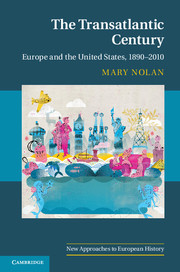Book contents
- Frontmatter
- Contents
- Illustrations
- Maps
- Tables
- Acknowledgments
- Introduction
- 1 An uncertain balance, 1890–1914
- 2 World War I: European crisis and American opportunity
- 3 Ambivalent engagement
- 4 The depression and transatlantic new deals
- 5 Strange affinities, new enemies
- 6 From world war to Cold War
- 7 Cooperation, competition, containment
- 8 Culture wars
- 9 The American Century erodes, 1968–1979
- 10 Renewed conflict and surprising collapse
- 11 A widening Atlantic
- 12 Imperial America, estranged Europe
- Suggested readings
- Index
- References
9 - The American Century erodes, 1968–1979
Published online by Cambridge University Press: 05 November 2012
- Frontmatter
- Contents
- Illustrations
- Maps
- Tables
- Acknowledgments
- Introduction
- 1 An uncertain balance, 1890–1914
- 2 World War I: European crisis and American opportunity
- 3 Ambivalent engagement
- 4 The depression and transatlantic new deals
- 5 Strange affinities, new enemies
- 6 From world war to Cold War
- 7 Cooperation, competition, containment
- 8 Culture wars
- 9 The American Century erodes, 1968–1979
- 10 Renewed conflict and surprising collapse
- 11 A widening Atlantic
- 12 Imperial America, estranged Europe
- Suggested readings
- Index
- References
Summary
Student protests and massive strikes, Soviet troops moving into Prague and American ones leaving Saigon, rising oil prices and endless gas lines, soaring inflation and collapsing economic growth, arms control and renewed missile crises, détente in Europe and hot Cold War conflicts in Africa and Asia. These contradictory events from the tumultuous late sixties and seventies threw transatlantic relations into turmoil. The postwar economic order descended into crisis due to the collapse of Bretton Woods, the exhaustion of Fordism, and the ineffectuality of Keynesianism. The Cold War political consensus frayed, creating stormy domestic politics and opening the way for a renegotiation of East–West relations in Europe as well as for new social movements and transnational alliances. A weakened and less confident United States sought to reassert leadership in Europe and globally, while Western Europeans strove for more autonomy. American hegemony – economic, cultural, military, and political – faced a serious challenge for the first time.
The American Century in Europe rested on five pillars. The first was American economic prowess, embodied in Fordist mass production, technological innovation, unmatched productivity, and high wages that enabled the mass consumption of cars, consumer durables, and mass culture. The second was America’s unchallenged military might, conventional and nuclear, and the presence of American weapons and military personnel across Western Europe. The third was the transatlantic consensus about anti-communism and containment but also about Keynesianism and generous social policies. The fourth pillar was widespread Western European admiration for America’s political values, global presence, and popular culture. Finally, Western Europe accepted, if at times grudgingly, its role as the junior partner in an American empire built largely by invitation but supplemented by American pressure, threats, and covert intervention when necessary. How did the challenges and crises of these years erode the hard and soft power on which America’s postwar dominance had been built?
- Type
- Chapter
- Information
- The Transatlantic CenturyEurope and America, 1890–2010, pp. 267 - 303Publisher: Cambridge University PressPrint publication year: 2012



